Report: UK SME's International Business Strategy in Chinese Market
VerifiedAdded on 2023/06/10
|14
|4201
|103
Report
AI Summary
This report examines a UK SME's plan to expand its business into the Chinese market, focusing on selling UHT milk for children aged three to eleven. It delves into the business drivers behind this expansion, highlighting the limitations of the home market and potential excess production. The report also analyzes trade barriers, including cultural, natural, non-tariff, and tariff barriers, which the SME may encounter. Ethical and social issues, such as unethical accounting practices, harassment, discrimination, and technology privacy, are discussed as crucial considerations for the company. Furthermore, the report explores cultural preferences in China that the business must understand and adapt to, along with various expansion methods the company can employ to successfully penetrate the Chinese market. Desklib provides access to similar solved assignments and past papers for students.
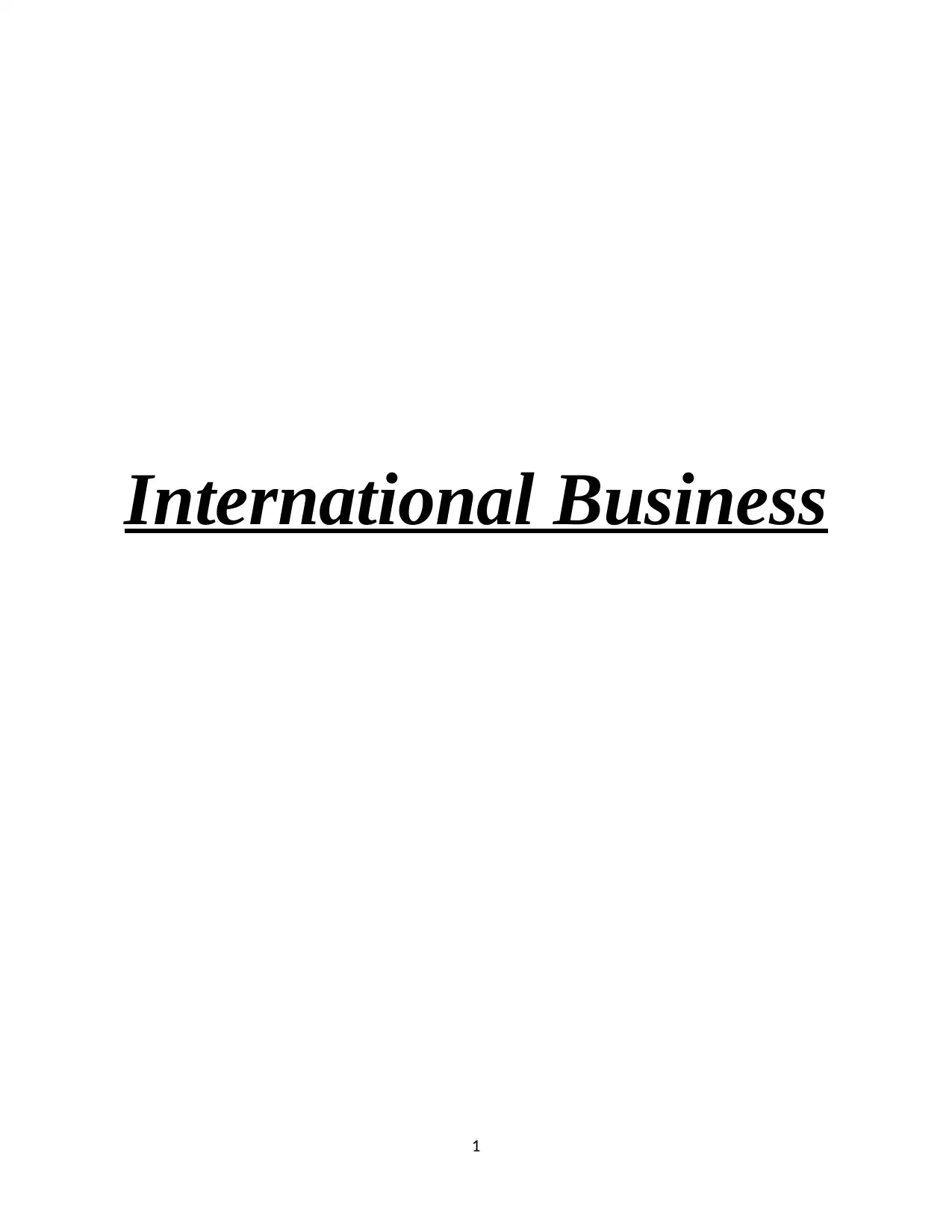
International Business
1
1
Paraphrase This Document
Need a fresh take? Get an instant paraphrase of this document with our AI Paraphraser
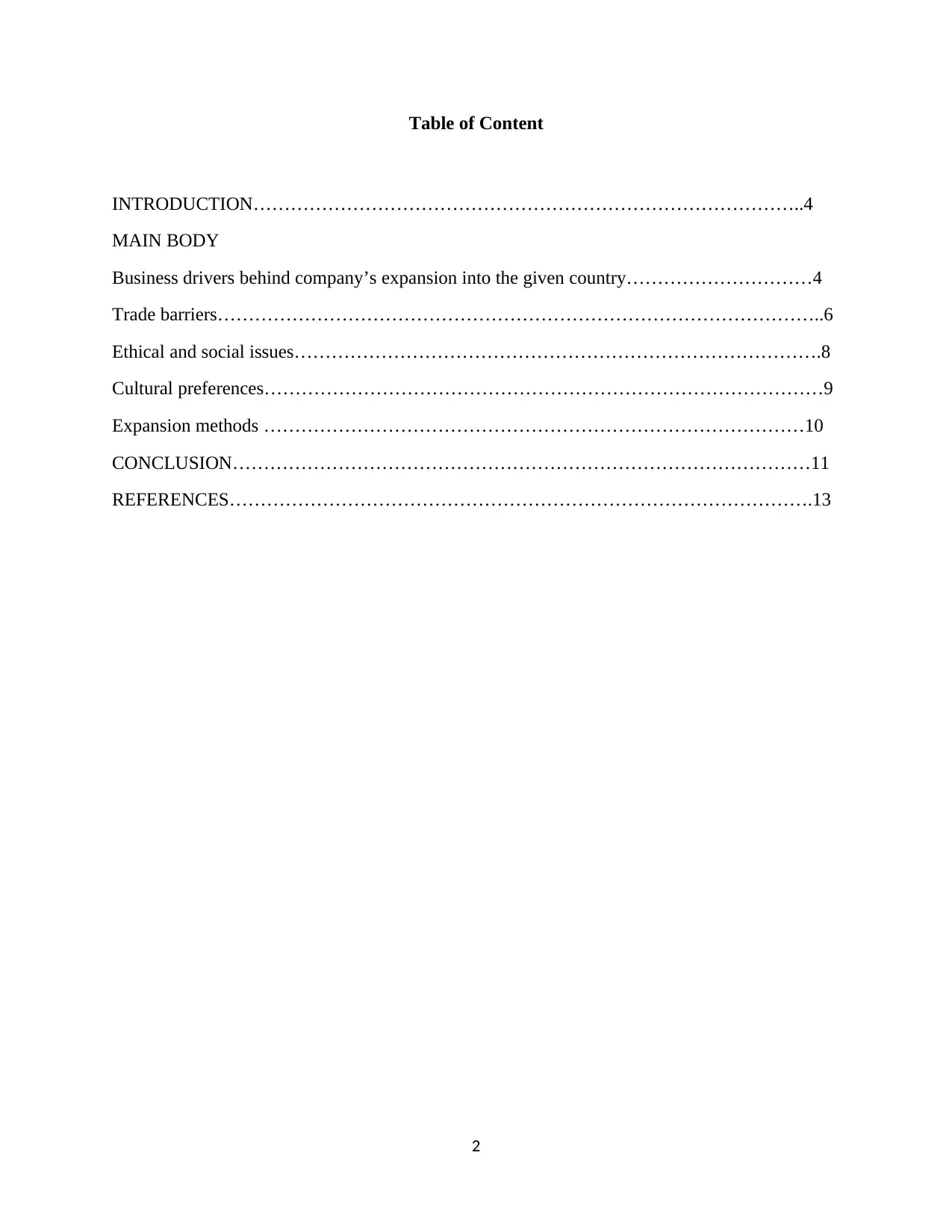
Table of Content
INTRODUCTION……………………………………………………………………………..4
MAIN BODY
Business drivers behind company’s expansion into the given country…………………………4
Trade barriers……………………………………………………………………………………..6
Ethical and social issues………………………………………………………………………….8
Cultural preferences………………………………………………………………………………9
Expansion methods ……………………………………………………………………………10
CONCLUSION…………………………………………………………………………………11
REFERENCES………………………………………………………………………………….13
2
INTRODUCTION……………………………………………………………………………..4
MAIN BODY
Business drivers behind company’s expansion into the given country…………………………4
Trade barriers……………………………………………………………………………………..6
Ethical and social issues………………………………………………………………………….8
Cultural preferences………………………………………………………………………………9
Expansion methods ……………………………………………………………………………10
CONCLUSION…………………………………………………………………………………11
REFERENCES………………………………………………………………………………….13
2

Executive Summary
The overall report is about international business and their objective is to tap into Chinese market
for selling UHT milk which is specially for small aged children. . They want to expand their
market into result oriented manner so that they can increase their market share. The report
basically consist of the drivers of business behind the expansion of company into the given
country and also about the trade barriers. The report also consist of ethical and social issues
which needs to be considered by the UK SME. The report will cover discussion about the
cultural preferences which needs to be considered by the business and also about the expansion
methods to be chosen by the company.
3
The overall report is about international business and their objective is to tap into Chinese market
for selling UHT milk which is specially for small aged children. . They want to expand their
market into result oriented manner so that they can increase their market share. The report
basically consist of the drivers of business behind the expansion of company into the given
country and also about the trade barriers. The report also consist of ethical and social issues
which needs to be considered by the UK SME. The report will cover discussion about the
cultural preferences which needs to be considered by the business and also about the expansion
methods to be chosen by the company.
3
⊘ This is a preview!⊘
Do you want full access?
Subscribe today to unlock all pages.

Trusted by 1+ million students worldwide
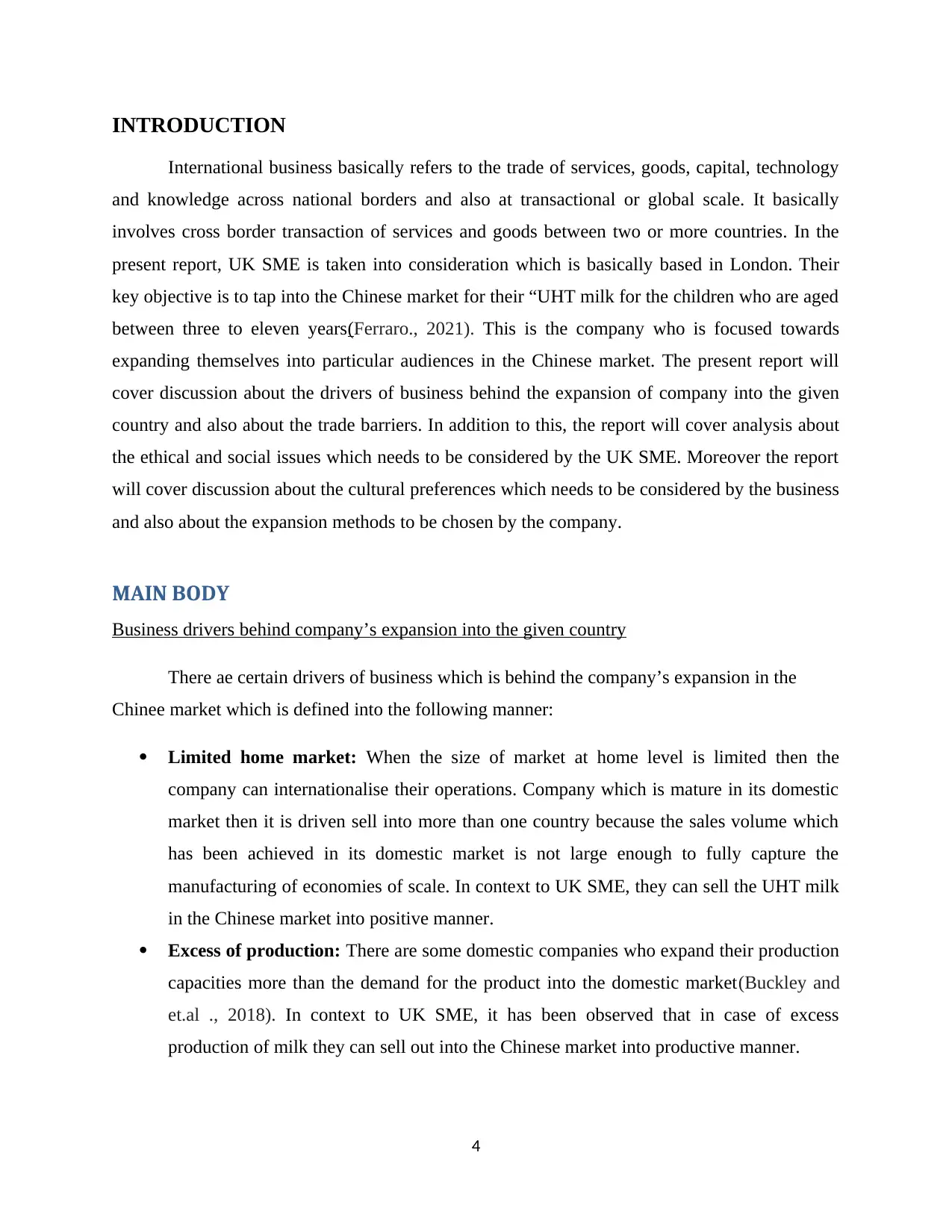
INTRODUCTION
International business basically refers to the trade of services, goods, capital, technology
and knowledge across national borders and also at transactional or global scale. It basically
involves cross border transaction of services and goods between two or more countries. In the
present report, UK SME is taken into consideration which is basically based in London. Their
key objective is to tap into the Chinese market for their “UHT milk for the children who are aged
between three to eleven years(Ferraro., 2021). This is the company who is focused towards
expanding themselves into particular audiences in the Chinese market. The present report will
cover discussion about the drivers of business behind the expansion of company into the given
country and also about the trade barriers. In addition to this, the report will cover analysis about
the ethical and social issues which needs to be considered by the UK SME. Moreover the report
will cover discussion about the cultural preferences which needs to be considered by the business
and also about the expansion methods to be chosen by the company.
MAIN BODY
Business drivers behind company’s expansion into the given country
There ae certain drivers of business which is behind the company’s expansion in the
Chinee market which is defined into the following manner:
Limited home market: When the size of market at home level is limited then the
company can internationalise their operations. Company which is mature in its domestic
market then it is driven sell into more than one country because the sales volume which
has been achieved in its domestic market is not large enough to fully capture the
manufacturing of economies of scale. In context to UK SME, they can sell the UHT milk
in the Chinese market into positive manner.
Excess of production: There are some domestic companies who expand their production
capacities more than the demand for the product into the domestic market(Buckley and
et.al ., 2018). In context to UK SME, it has been observed that in case of excess
production of milk they can sell out into the Chinese market into productive manner.
4
International business basically refers to the trade of services, goods, capital, technology
and knowledge across national borders and also at transactional or global scale. It basically
involves cross border transaction of services and goods between two or more countries. In the
present report, UK SME is taken into consideration which is basically based in London. Their
key objective is to tap into the Chinese market for their “UHT milk for the children who are aged
between three to eleven years(Ferraro., 2021). This is the company who is focused towards
expanding themselves into particular audiences in the Chinese market. The present report will
cover discussion about the drivers of business behind the expansion of company into the given
country and also about the trade barriers. In addition to this, the report will cover analysis about
the ethical and social issues which needs to be considered by the UK SME. Moreover the report
will cover discussion about the cultural preferences which needs to be considered by the business
and also about the expansion methods to be chosen by the company.
MAIN BODY
Business drivers behind company’s expansion into the given country
There ae certain drivers of business which is behind the company’s expansion in the
Chinee market which is defined into the following manner:
Limited home market: When the size of market at home level is limited then the
company can internationalise their operations. Company which is mature in its domestic
market then it is driven sell into more than one country because the sales volume which
has been achieved in its domestic market is not large enough to fully capture the
manufacturing of economies of scale. In context to UK SME, they can sell the UHT milk
in the Chinese market into positive manner.
Excess of production: There are some domestic companies who expand their production
capacities more than the demand for the product into the domestic market(Buckley and
et.al ., 2018). In context to UK SME, it has been observed that in case of excess
production of milk they can sell out into the Chinese market into productive manner.
4
Paraphrase This Document
Need a fresh take? Get an instant paraphrase of this document with our AI Paraphraser
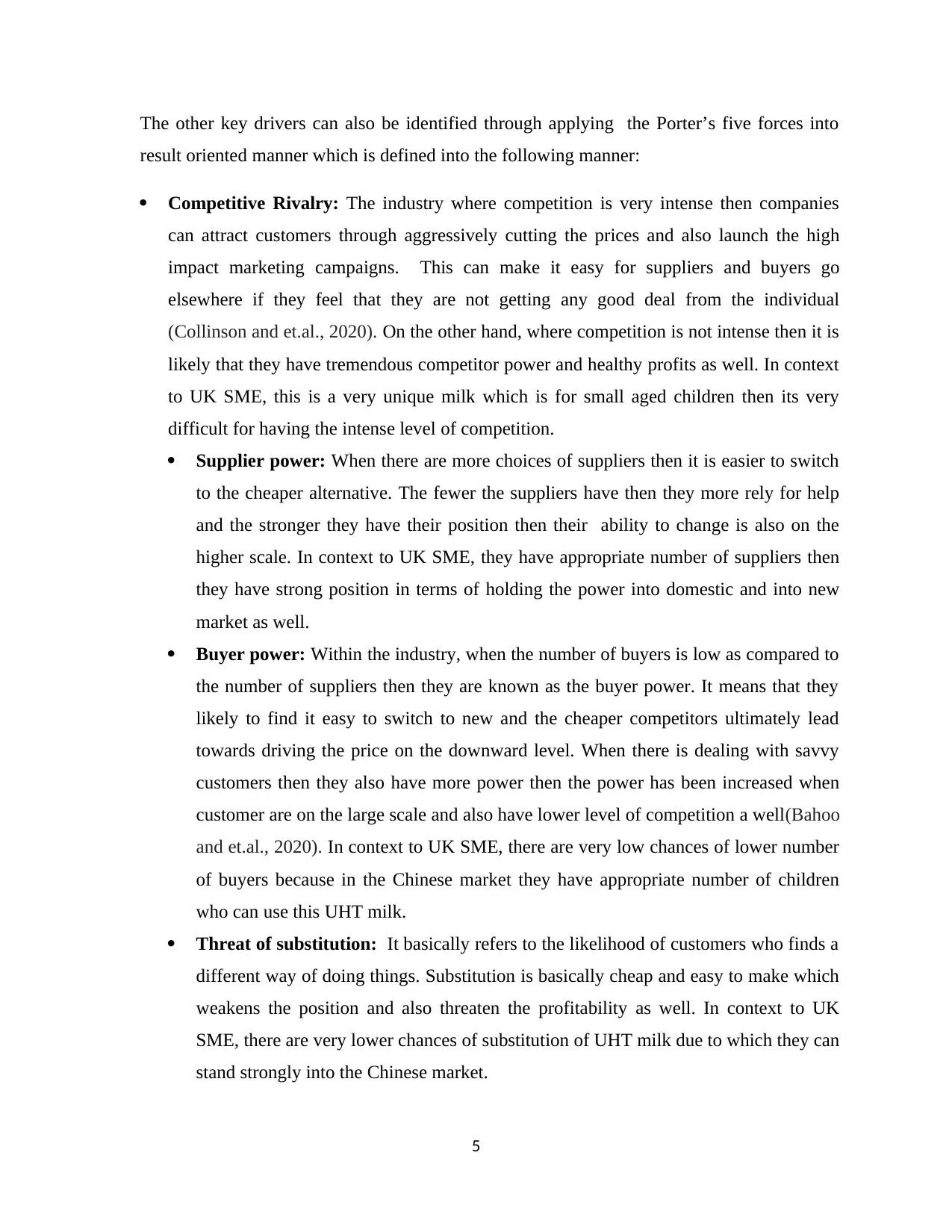
The other key drivers can also be identified through applying the Porter’s five forces into
result oriented manner which is defined into the following manner:
Competitive Rivalry: The industry where competition is very intense then companies
can attract customers through aggressively cutting the prices and also launch the high
impact marketing campaigns. This can make it easy for suppliers and buyers go
elsewhere if they feel that they are not getting any good deal from the individual
(Collinson and et.al., 2020). On the other hand, where competition is not intense then it is
likely that they have tremendous competitor power and healthy profits as well. In context
to UK SME, this is a very unique milk which is for small aged children then its very
difficult for having the intense level of competition.
Supplier power: When there are more choices of suppliers then it is easier to switch
to the cheaper alternative. The fewer the suppliers have then they more rely for help
and the stronger they have their position then their ability to change is also on the
higher scale. In context to UK SME, they have appropriate number of suppliers then
they have strong position in terms of holding the power into domestic and into new
market as well.
Buyer power: Within the industry, when the number of buyers is low as compared to
the number of suppliers then they are known as the buyer power. It means that they
likely to find it easy to switch to new and the cheaper competitors ultimately lead
towards driving the price on the downward level. When there is dealing with savvy
customers then they also have more power then the power has been increased when
customer are on the large scale and also have lower level of competition a well(Bahoo
and et.al., 2020). In context to UK SME, there are very low chances of lower number
of buyers because in the Chinese market they have appropriate number of children
who can use this UHT milk.
Threat of substitution: It basically refers to the likelihood of customers who finds a
different way of doing things. Substitution is basically cheap and easy to make which
weakens the position and also threaten the profitability as well. In context to UK
SME, there are very lower chances of substitution of UHT milk due to which they can
stand strongly into the Chinese market.
5
result oriented manner which is defined into the following manner:
Competitive Rivalry: The industry where competition is very intense then companies
can attract customers through aggressively cutting the prices and also launch the high
impact marketing campaigns. This can make it easy for suppliers and buyers go
elsewhere if they feel that they are not getting any good deal from the individual
(Collinson and et.al., 2020). On the other hand, where competition is not intense then it is
likely that they have tremendous competitor power and healthy profits as well. In context
to UK SME, this is a very unique milk which is for small aged children then its very
difficult for having the intense level of competition.
Supplier power: When there are more choices of suppliers then it is easier to switch
to the cheaper alternative. The fewer the suppliers have then they more rely for help
and the stronger they have their position then their ability to change is also on the
higher scale. In context to UK SME, they have appropriate number of suppliers then
they have strong position in terms of holding the power into domestic and into new
market as well.
Buyer power: Within the industry, when the number of buyers is low as compared to
the number of suppliers then they are known as the buyer power. It means that they
likely to find it easy to switch to new and the cheaper competitors ultimately lead
towards driving the price on the downward level. When there is dealing with savvy
customers then they also have more power then the power has been increased when
customer are on the large scale and also have lower level of competition a well(Bahoo
and et.al., 2020). In context to UK SME, there are very low chances of lower number
of buyers because in the Chinese market they have appropriate number of children
who can use this UHT milk.
Threat of substitution: It basically refers to the likelihood of customers who finds a
different way of doing things. Substitution is basically cheap and easy to make which
weakens the position and also threaten the profitability as well. In context to UK
SME, there are very lower chances of substitution of UHT milk due to which they can
stand strongly into the Chinese market.
5
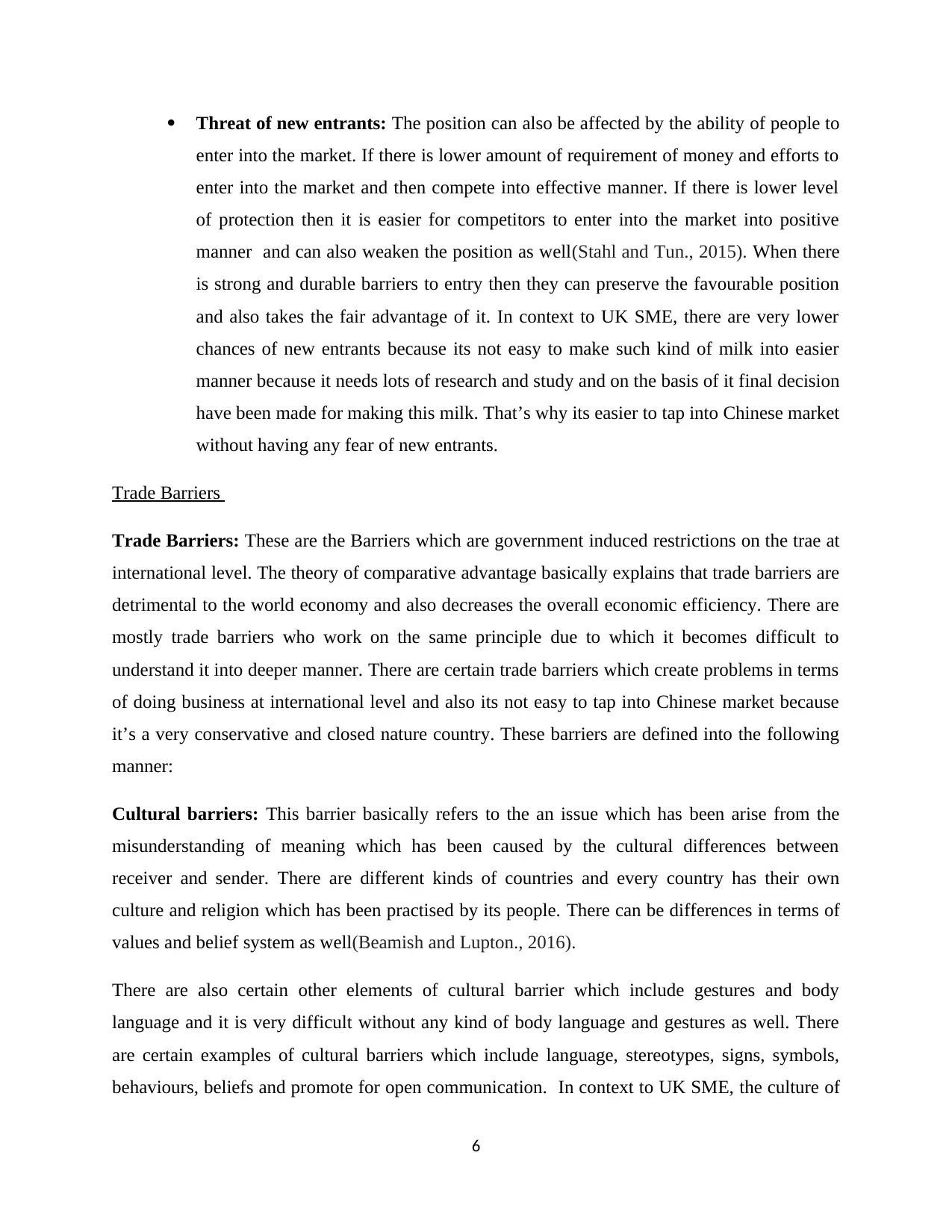
Threat of new entrants: The position can also be affected by the ability of people to
enter into the market. If there is lower amount of requirement of money and efforts to
enter into the market and then compete into effective manner. If there is lower level
of protection then it is easier for competitors to enter into the market into positive
manner and can also weaken the position as well(Stahl and Tun., 2015). When there
is strong and durable barriers to entry then they can preserve the favourable position
and also takes the fair advantage of it. In context to UK SME, there are very lower
chances of new entrants because its not easy to make such kind of milk into easier
manner because it needs lots of research and study and on the basis of it final decision
have been made for making this milk. That’s why its easier to tap into Chinese market
without having any fear of new entrants.
Trade Barriers
Trade Barriers: These are the Barriers which are government induced restrictions on the trae at
international level. The theory of comparative advantage basically explains that trade barriers are
detrimental to the world economy and also decreases the overall economic efficiency. There are
mostly trade barriers who work on the same principle due to which it becomes difficult to
understand it into deeper manner. There are certain trade barriers which create problems in terms
of doing business at international level and also its not easy to tap into Chinese market because
it’s a very conservative and closed nature country. These barriers are defined into the following
manner:
Cultural barriers: This barrier basically refers to the an issue which has been arise from the
misunderstanding of meaning which has been caused by the cultural differences between
receiver and sender. There are different kinds of countries and every country has their own
culture and religion which has been practised by its people. There can be differences in terms of
values and belief system as well(Beamish and Lupton., 2016).
There are also certain other elements of cultural barrier which include gestures and body
language and it is very difficult without any kind of body language and gestures as well. There
are certain examples of cultural barriers which include language, stereotypes, signs, symbols,
behaviours, beliefs and promote for open communication. In context to UK SME, the culture of
6
enter into the market. If there is lower amount of requirement of money and efforts to
enter into the market and then compete into effective manner. If there is lower level
of protection then it is easier for competitors to enter into the market into positive
manner and can also weaken the position as well(Stahl and Tun., 2015). When there
is strong and durable barriers to entry then they can preserve the favourable position
and also takes the fair advantage of it. In context to UK SME, there are very lower
chances of new entrants because its not easy to make such kind of milk into easier
manner because it needs lots of research and study and on the basis of it final decision
have been made for making this milk. That’s why its easier to tap into Chinese market
without having any fear of new entrants.
Trade Barriers
Trade Barriers: These are the Barriers which are government induced restrictions on the trae at
international level. The theory of comparative advantage basically explains that trade barriers are
detrimental to the world economy and also decreases the overall economic efficiency. There are
mostly trade barriers who work on the same principle due to which it becomes difficult to
understand it into deeper manner. There are certain trade barriers which create problems in terms
of doing business at international level and also its not easy to tap into Chinese market because
it’s a very conservative and closed nature country. These barriers are defined into the following
manner:
Cultural barriers: This barrier basically refers to the an issue which has been arise from the
misunderstanding of meaning which has been caused by the cultural differences between
receiver and sender. There are different kinds of countries and every country has their own
culture and religion which has been practised by its people. There can be differences in terms of
values and belief system as well(Beamish and Lupton., 2016).
There are also certain other elements of cultural barrier which include gestures and body
language and it is very difficult without any kind of body language and gestures as well. There
are certain examples of cultural barriers which include language, stereotypes, signs, symbols,
behaviours, beliefs and promote for open communication. In context to UK SME, the culture of
6
⊘ This is a preview!⊘
Do you want full access?
Subscribe today to unlock all pages.

Trusted by 1+ million students worldwide
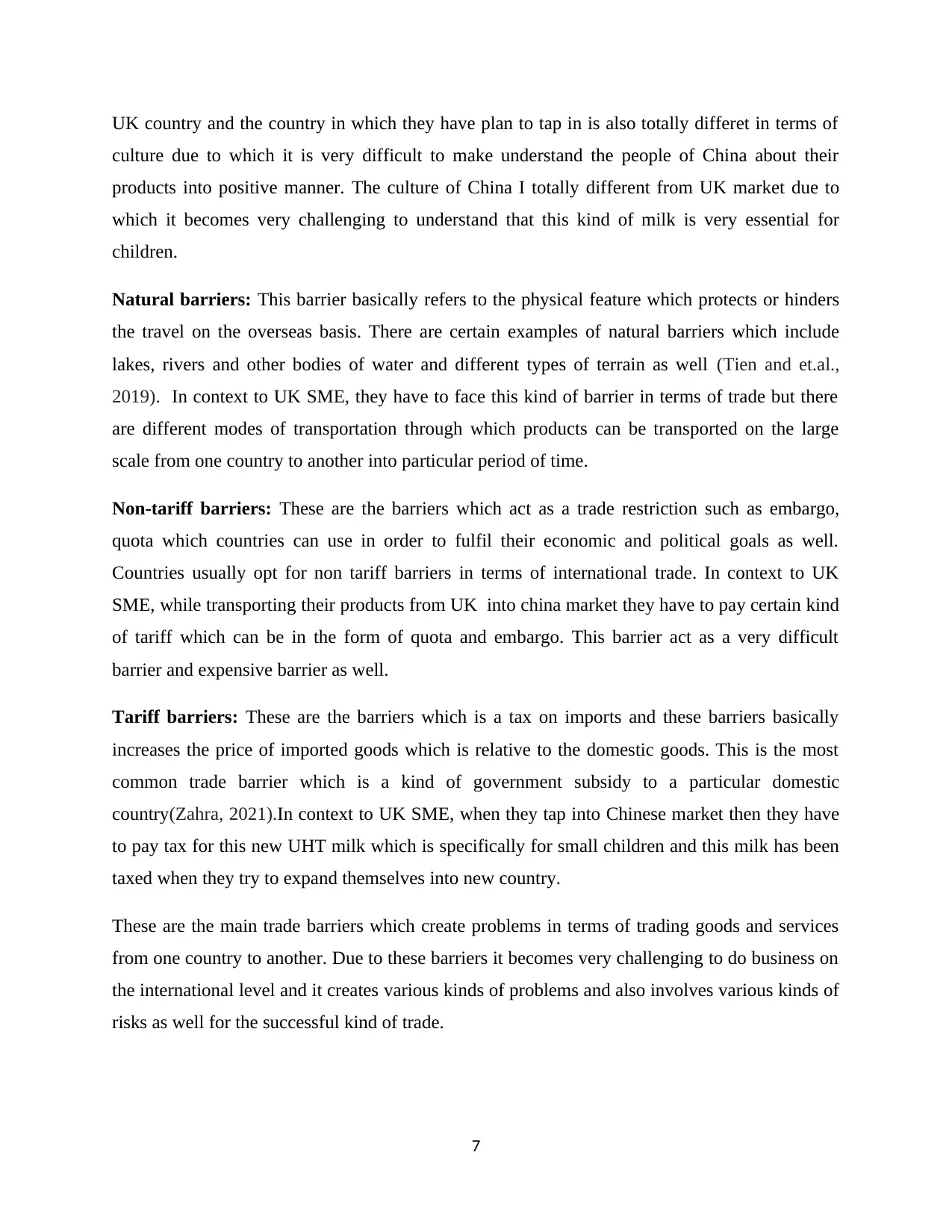
UK country and the country in which they have plan to tap in is also totally differet in terms of
culture due to which it is very difficult to make understand the people of China about their
products into positive manner. The culture of China I totally different from UK market due to
which it becomes very challenging to understand that this kind of milk is very essential for
children.
Natural barriers: This barrier basically refers to the physical feature which protects or hinders
the travel on the overseas basis. There are certain examples of natural barriers which include
lakes, rivers and other bodies of water and different types of terrain as well (Tien and et.al.,
2019). In context to UK SME, they have to face this kind of barrier in terms of trade but there
are different modes of transportation through which products can be transported on the large
scale from one country to another into particular period of time.
Non-tariff barriers: These are the barriers which act as a trade restriction such as embargo,
quota which countries can use in order to fulfil their economic and political goals as well.
Countries usually opt for non tariff barriers in terms of international trade. In context to UK
SME, while transporting their products from UK into china market they have to pay certain kind
of tariff which can be in the form of quota and embargo. This barrier act as a very difficult
barrier and expensive barrier as well.
Tariff barriers: These are the barriers which is a tax on imports and these barriers basically
increases the price of imported goods which is relative to the domestic goods. This is the most
common trade barrier which is a kind of government subsidy to a particular domestic
country(Zahra, 2021).In context to UK SME, when they tap into Chinese market then they have
to pay tax for this new UHT milk which is specifically for small children and this milk has been
taxed when they try to expand themselves into new country.
These are the main trade barriers which create problems in terms of trading goods and services
from one country to another. Due to these barriers it becomes very challenging to do business on
the international level and it creates various kinds of problems and also involves various kinds of
risks as well for the successful kind of trade.
7
culture due to which it is very difficult to make understand the people of China about their
products into positive manner. The culture of China I totally different from UK market due to
which it becomes very challenging to understand that this kind of milk is very essential for
children.
Natural barriers: This barrier basically refers to the physical feature which protects or hinders
the travel on the overseas basis. There are certain examples of natural barriers which include
lakes, rivers and other bodies of water and different types of terrain as well (Tien and et.al.,
2019). In context to UK SME, they have to face this kind of barrier in terms of trade but there
are different modes of transportation through which products can be transported on the large
scale from one country to another into particular period of time.
Non-tariff barriers: These are the barriers which act as a trade restriction such as embargo,
quota which countries can use in order to fulfil their economic and political goals as well.
Countries usually opt for non tariff barriers in terms of international trade. In context to UK
SME, while transporting their products from UK into china market they have to pay certain kind
of tariff which can be in the form of quota and embargo. This barrier act as a very difficult
barrier and expensive barrier as well.
Tariff barriers: These are the barriers which is a tax on imports and these barriers basically
increases the price of imported goods which is relative to the domestic goods. This is the most
common trade barrier which is a kind of government subsidy to a particular domestic
country(Zahra, 2021).In context to UK SME, when they tap into Chinese market then they have
to pay tax for this new UHT milk which is specifically for small children and this milk has been
taxed when they try to expand themselves into new country.
These are the main trade barriers which create problems in terms of trading goods and services
from one country to another. Due to these barriers it becomes very challenging to do business on
the international level and it creates various kinds of problems and also involves various kinds of
risks as well for the successful kind of trade.
7
Paraphrase This Document
Need a fresh take? Get an instant paraphrase of this document with our AI Paraphraser
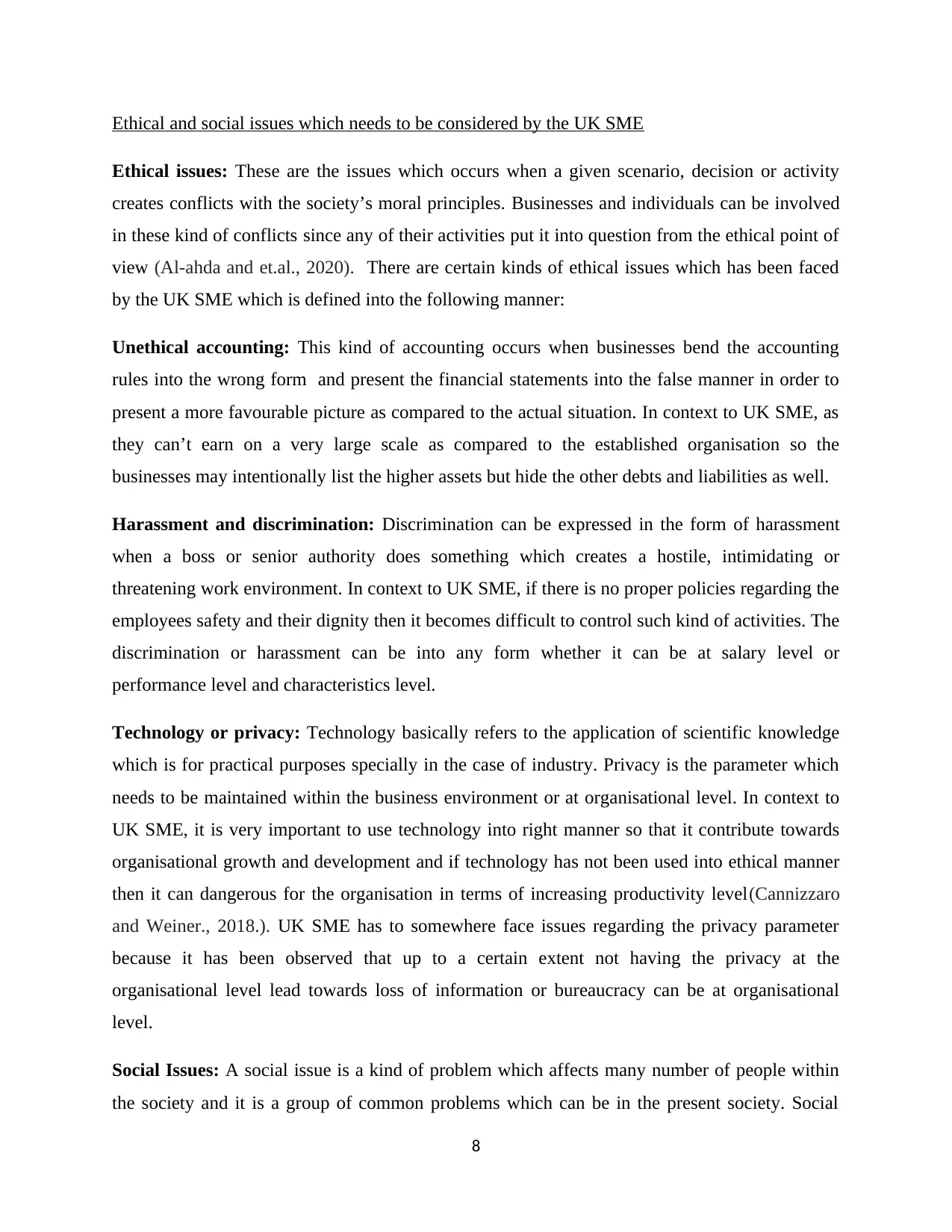
Ethical and social issues which needs to be considered by the UK SME
Ethical issues: These are the issues which occurs when a given scenario, decision or activity
creates conflicts with the society’s moral principles. Businesses and individuals can be involved
in these kind of conflicts since any of their activities put it into question from the ethical point of
view (Al-ahda and et.al., 2020). There are certain kinds of ethical issues which has been faced
by the UK SME which is defined into the following manner:
Unethical accounting: This kind of accounting occurs when businesses bend the accounting
rules into the wrong form and present the financial statements into the false manner in order to
present a more favourable picture as compared to the actual situation. In context to UK SME, as
they can’t earn on a very large scale as compared to the established organisation so the
businesses may intentionally list the higher assets but hide the other debts and liabilities as well.
Harassment and discrimination: Discrimination can be expressed in the form of harassment
when a boss or senior authority does something which creates a hostile, intimidating or
threatening work environment. In context to UK SME, if there is no proper policies regarding the
employees safety and their dignity then it becomes difficult to control such kind of activities. The
discrimination or harassment can be into any form whether it can be at salary level or
performance level and characteristics level.
Technology or privacy: Technology basically refers to the application of scientific knowledge
which is for practical purposes specially in the case of industry. Privacy is the parameter which
needs to be maintained within the business environment or at organisational level. In context to
UK SME, it is very important to use technology into right manner so that it contribute towards
organisational growth and development and if technology has not been used into ethical manner
then it can dangerous for the organisation in terms of increasing productivity level(Cannizzaro
and Weiner., 2018.). UK SME has to somewhere face issues regarding the privacy parameter
because it has been observed that up to a certain extent not having the privacy at the
organisational level lead towards loss of information or bureaucracy can be at organisational
level.
Social Issues: A social issue is a kind of problem which affects many number of people within
the society and it is a group of common problems which can be in the present society. Social
8
Ethical issues: These are the issues which occurs when a given scenario, decision or activity
creates conflicts with the society’s moral principles. Businesses and individuals can be involved
in these kind of conflicts since any of their activities put it into question from the ethical point of
view (Al-ahda and et.al., 2020). There are certain kinds of ethical issues which has been faced
by the UK SME which is defined into the following manner:
Unethical accounting: This kind of accounting occurs when businesses bend the accounting
rules into the wrong form and present the financial statements into the false manner in order to
present a more favourable picture as compared to the actual situation. In context to UK SME, as
they can’t earn on a very large scale as compared to the established organisation so the
businesses may intentionally list the higher assets but hide the other debts and liabilities as well.
Harassment and discrimination: Discrimination can be expressed in the form of harassment
when a boss or senior authority does something which creates a hostile, intimidating or
threatening work environment. In context to UK SME, if there is no proper policies regarding the
employees safety and their dignity then it becomes difficult to control such kind of activities. The
discrimination or harassment can be into any form whether it can be at salary level or
performance level and characteristics level.
Technology or privacy: Technology basically refers to the application of scientific knowledge
which is for practical purposes specially in the case of industry. Privacy is the parameter which
needs to be maintained within the business environment or at organisational level. In context to
UK SME, it is very important to use technology into right manner so that it contribute towards
organisational growth and development and if technology has not been used into ethical manner
then it can dangerous for the organisation in terms of increasing productivity level(Cannizzaro
and Weiner., 2018.). UK SME has to somewhere face issues regarding the privacy parameter
because it has been observed that up to a certain extent not having the privacy at the
organisational level lead towards loss of information or bureaucracy can be at organisational
level.
Social Issues: A social issue is a kind of problem which affects many number of people within
the society and it is a group of common problems which can be in the present society. Social
8
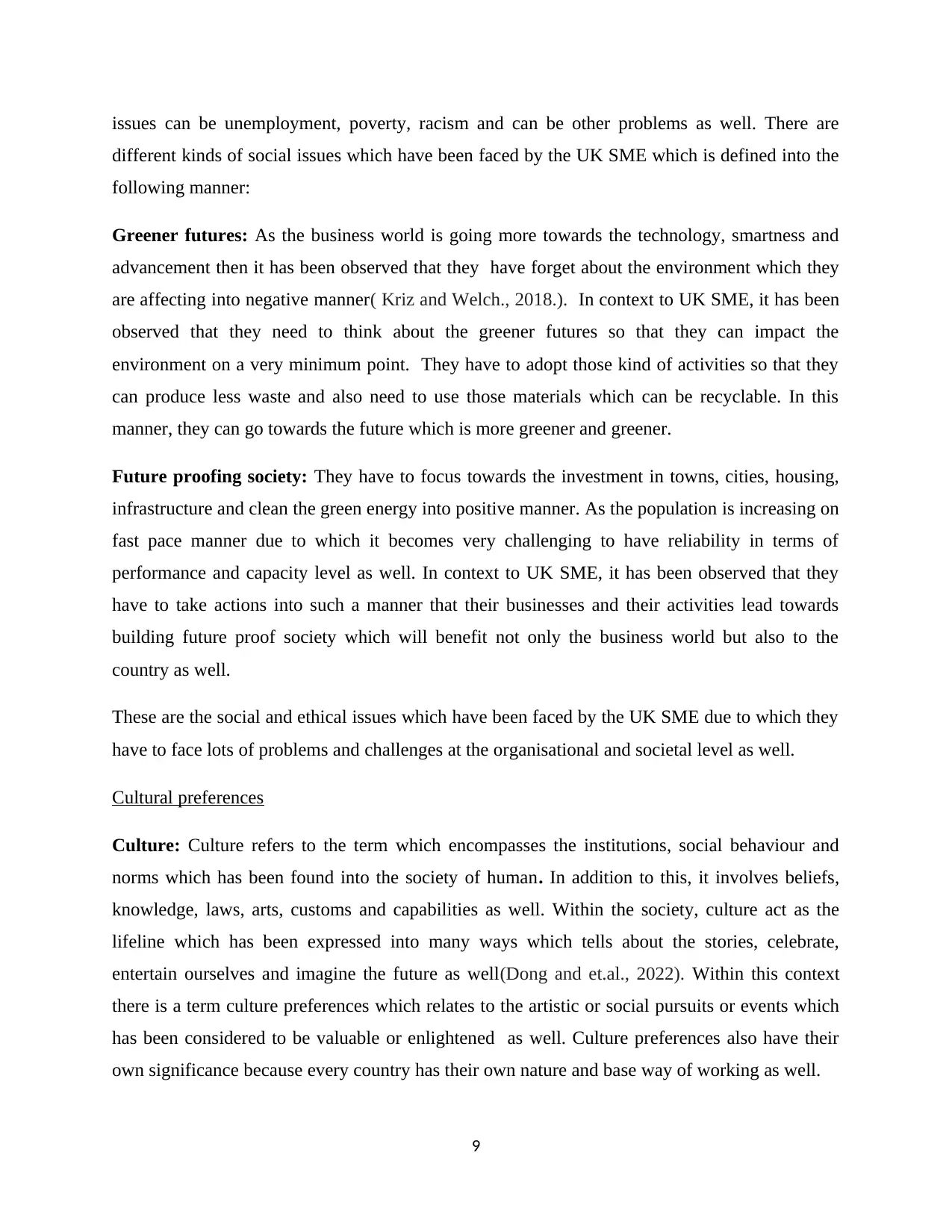
issues can be unemployment, poverty, racism and can be other problems as well. There are
different kinds of social issues which have been faced by the UK SME which is defined into the
following manner:
Greener futures: As the business world is going more towards the technology, smartness and
advancement then it has been observed that they have forget about the environment which they
are affecting into negative manner( Kriz and Welch., 2018.). In context to UK SME, it has been
observed that they need to think about the greener futures so that they can impact the
environment on a very minimum point. They have to adopt those kind of activities so that they
can produce less waste and also need to use those materials which can be recyclable. In this
manner, they can go towards the future which is more greener and greener.
Future proofing society: They have to focus towards the investment in towns, cities, housing,
infrastructure and clean the green energy into positive manner. As the population is increasing on
fast pace manner due to which it becomes very challenging to have reliability in terms of
performance and capacity level as well. In context to UK SME, it has been observed that they
have to take actions into such a manner that their businesses and their activities lead towards
building future proof society which will benefit not only the business world but also to the
country as well.
These are the social and ethical issues which have been faced by the UK SME due to which they
have to face lots of problems and challenges at the organisational and societal level as well.
Cultural preferences
Culture: Culture refers to the term which encompasses the institutions, social behaviour and
norms which has been found into the society of human. In addition to this, it involves beliefs,
knowledge, laws, arts, customs and capabilities as well. Within the society, culture act as the
lifeline which has been expressed into many ways which tells about the stories, celebrate,
entertain ourselves and imagine the future as well(Dong and et.al., 2022). Within this context
there is a term culture preferences which relates to the artistic or social pursuits or events which
has been considered to be valuable or enlightened as well. Culture preferences also have their
own significance because every country has their own nature and base way of working as well.
9
different kinds of social issues which have been faced by the UK SME which is defined into the
following manner:
Greener futures: As the business world is going more towards the technology, smartness and
advancement then it has been observed that they have forget about the environment which they
are affecting into negative manner( Kriz and Welch., 2018.). In context to UK SME, it has been
observed that they need to think about the greener futures so that they can impact the
environment on a very minimum point. They have to adopt those kind of activities so that they
can produce less waste and also need to use those materials which can be recyclable. In this
manner, they can go towards the future which is more greener and greener.
Future proofing society: They have to focus towards the investment in towns, cities, housing,
infrastructure and clean the green energy into positive manner. As the population is increasing on
fast pace manner due to which it becomes very challenging to have reliability in terms of
performance and capacity level as well. In context to UK SME, it has been observed that they
have to take actions into such a manner that their businesses and their activities lead towards
building future proof society which will benefit not only the business world but also to the
country as well.
These are the social and ethical issues which have been faced by the UK SME due to which they
have to face lots of problems and challenges at the organisational and societal level as well.
Cultural preferences
Culture: Culture refers to the term which encompasses the institutions, social behaviour and
norms which has been found into the society of human. In addition to this, it involves beliefs,
knowledge, laws, arts, customs and capabilities as well. Within the society, culture act as the
lifeline which has been expressed into many ways which tells about the stories, celebrate,
entertain ourselves and imagine the future as well(Dong and et.al., 2022). Within this context
there is a term culture preferences which relates to the artistic or social pursuits or events which
has been considered to be valuable or enlightened as well. Culture preferences also have their
own significance because every country has their own nature and base way of working as well.
9
⊘ This is a preview!⊘
Do you want full access?
Subscribe today to unlock all pages.

Trusted by 1+ million students worldwide

When UK SME has to tap into the Chinese market then they have to do lots of research
work and development as well because it is a very rigid country and also has lots of restrictions
as well. The Chinese business culture is majorly influenced by the Confucianism and this is a kid
of concept which implies that a the relationship network is very crucial and that is based on the
values of solidarity, loyalty, courtesy and modesty as well. Within the business or at personal
aspect, it follows the vertical structure which is highly respected(Edwards and et.al., 2016).
These are the people of china who are careful in terms of saving face for protecting individual
reputations and dignity as well. From the business perspective, Chinese people are most risk
averse and strict procedures have been exist for the decision making process.
The country of these people sees the business relationship from the long term perspective
and create relations rather than negotiate the contracts. Within the business culture of China, they
are very strict in terms of time for arriving for the meetings Its very important to inform the
partner in case of any kind of delay and needs to offer apology for this kind of delay. While
having any kind of business deal with Chinese market or Chinese people its very important that
business cards needs to be exchanged upon meeting of a new person and also needs to follow a
proper protocol. Within the meetings, it is important to have interpretation services so that it can
be wind up as soon as possible. That’s why its very important for UK SME to have a proper
understanding about the culture of Chinese market so that there can be no confusion while doing
the business deal into positive manner. When UK SME has proper knowledge and idea about the
culture of a country then its easier for them to tap easily into the new market i.e. Chinese market.
That’s why its very important to understand about the significance of cultural preferences.
Expansion methods
There are different kinds of methods of expansion of business at large scale into the
business which is at the international level which are defined into the following manner:
Exporting: It is one of the common ways of entering into the international market and it
is basically the simplest mode of entry(Pant and Ramachandran, 2017). The initial
advantage of exporting goods at the organisational level dodges the expenses of
establishing a subsidiary in that country. Within this kind of mode of entry, the cost of
transportation is very high and also at the risk of environmental factors. The product or
10
work and development as well because it is a very rigid country and also has lots of restrictions
as well. The Chinese business culture is majorly influenced by the Confucianism and this is a kid
of concept which implies that a the relationship network is very crucial and that is based on the
values of solidarity, loyalty, courtesy and modesty as well. Within the business or at personal
aspect, it follows the vertical structure which is highly respected(Edwards and et.al., 2016).
These are the people of china who are careful in terms of saving face for protecting individual
reputations and dignity as well. From the business perspective, Chinese people are most risk
averse and strict procedures have been exist for the decision making process.
The country of these people sees the business relationship from the long term perspective
and create relations rather than negotiate the contracts. Within the business culture of China, they
are very strict in terms of time for arriving for the meetings Its very important to inform the
partner in case of any kind of delay and needs to offer apology for this kind of delay. While
having any kind of business deal with Chinese market or Chinese people its very important that
business cards needs to be exchanged upon meeting of a new person and also needs to follow a
proper protocol. Within the meetings, it is important to have interpretation services so that it can
be wind up as soon as possible. That’s why its very important for UK SME to have a proper
understanding about the culture of Chinese market so that there can be no confusion while doing
the business deal into positive manner. When UK SME has proper knowledge and idea about the
culture of a country then its easier for them to tap easily into the new market i.e. Chinese market.
That’s why its very important to understand about the significance of cultural preferences.
Expansion methods
There are different kinds of methods of expansion of business at large scale into the
business which is at the international level which are defined into the following manner:
Exporting: It is one of the common ways of entering into the international market and it
is basically the simplest mode of entry(Pant and Ramachandran, 2017). The initial
advantage of exporting goods at the organisational level dodges the expenses of
establishing a subsidiary in that country. Within this kind of mode of entry, the cost of
transportation is very high and also at the risk of environmental factors. The product or
10
Paraphrase This Document
Need a fresh take? Get an instant paraphrase of this document with our AI Paraphraser
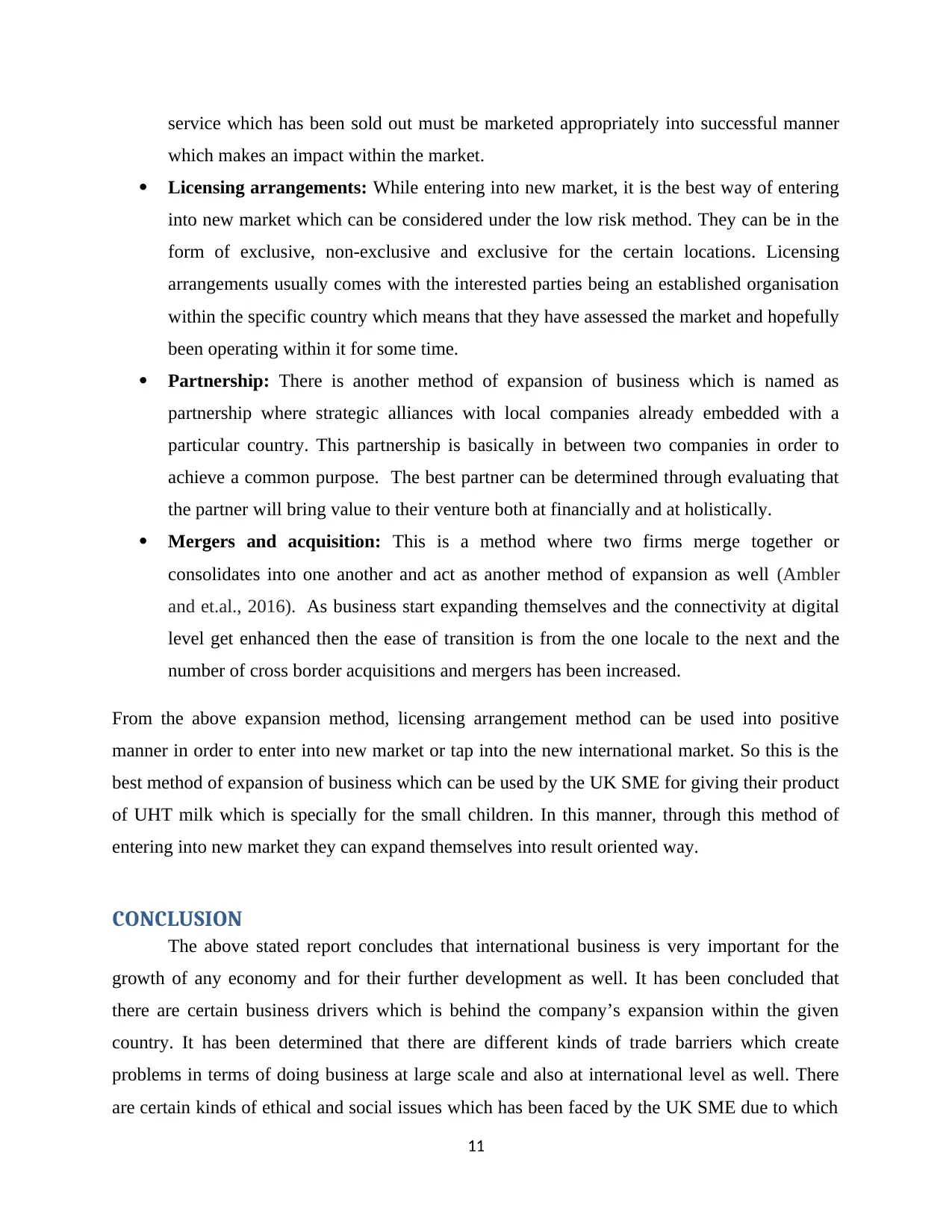
service which has been sold out must be marketed appropriately into successful manner
which makes an impact within the market.
Licensing arrangements: While entering into new market, it is the best way of entering
into new market which can be considered under the low risk method. They can be in the
form of exclusive, non-exclusive and exclusive for the certain locations. Licensing
arrangements usually comes with the interested parties being an established organisation
within the specific country which means that they have assessed the market and hopefully
been operating within it for some time.
Partnership: There is another method of expansion of business which is named as
partnership where strategic alliances with local companies already embedded with a
particular country. This partnership is basically in between two companies in order to
achieve a common purpose. The best partner can be determined through evaluating that
the partner will bring value to their venture both at financially and at holistically.
Mergers and acquisition: This is a method where two firms merge together or
consolidates into one another and act as another method of expansion as well (Ambler
and et.al., 2016). As business start expanding themselves and the connectivity at digital
level get enhanced then the ease of transition is from the one locale to the next and the
number of cross border acquisitions and mergers has been increased.
From the above expansion method, licensing arrangement method can be used into positive
manner in order to enter into new market or tap into the new international market. So this is the
best method of expansion of business which can be used by the UK SME for giving their product
of UHT milk which is specially for the small children. In this manner, through this method of
entering into new market they can expand themselves into result oriented way.
CONCLUSION
The above stated report concludes that international business is very important for the
growth of any economy and for their further development as well. It has been concluded that
there are certain business drivers which is behind the company’s expansion within the given
country. It has been determined that there are different kinds of trade barriers which create
problems in terms of doing business at large scale and also at international level as well. There
are certain kinds of ethical and social issues which has been faced by the UK SME due to which
11
which makes an impact within the market.
Licensing arrangements: While entering into new market, it is the best way of entering
into new market which can be considered under the low risk method. They can be in the
form of exclusive, non-exclusive and exclusive for the certain locations. Licensing
arrangements usually comes with the interested parties being an established organisation
within the specific country which means that they have assessed the market and hopefully
been operating within it for some time.
Partnership: There is another method of expansion of business which is named as
partnership where strategic alliances with local companies already embedded with a
particular country. This partnership is basically in between two companies in order to
achieve a common purpose. The best partner can be determined through evaluating that
the partner will bring value to their venture both at financially and at holistically.
Mergers and acquisition: This is a method where two firms merge together or
consolidates into one another and act as another method of expansion as well (Ambler
and et.al., 2016). As business start expanding themselves and the connectivity at digital
level get enhanced then the ease of transition is from the one locale to the next and the
number of cross border acquisitions and mergers has been increased.
From the above expansion method, licensing arrangement method can be used into positive
manner in order to enter into new market or tap into the new international market. So this is the
best method of expansion of business which can be used by the UK SME for giving their product
of UHT milk which is specially for the small children. In this manner, through this method of
entering into new market they can expand themselves into result oriented way.
CONCLUSION
The above stated report concludes that international business is very important for the
growth of any economy and for their further development as well. It has been concluded that
there are certain business drivers which is behind the company’s expansion within the given
country. It has been determined that there are different kinds of trade barriers which create
problems in terms of doing business at large scale and also at international level as well. There
are certain kinds of ethical and social issues which has been faced by the UK SME due to which
11
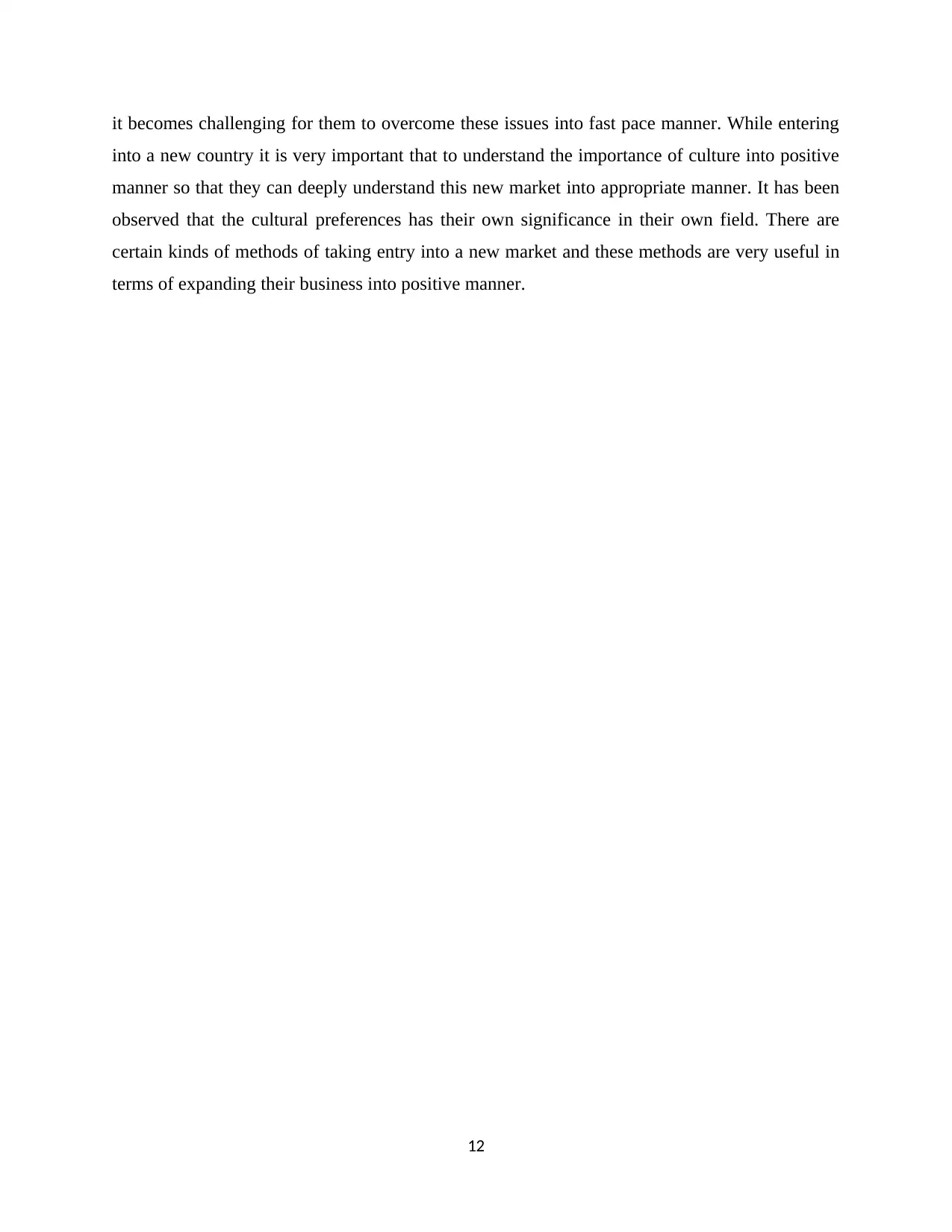
it becomes challenging for them to overcome these issues into fast pace manner. While entering
into a new country it is very important that to understand the importance of culture into positive
manner so that they can deeply understand this new market into appropriate manner. It has been
observed that the cultural preferences has their own significance in their own field. There are
certain kinds of methods of taking entry into a new market and these methods are very useful in
terms of expanding their business into positive manner.
12
into a new country it is very important that to understand the importance of culture into positive
manner so that they can deeply understand this new market into appropriate manner. It has been
observed that the cultural preferences has their own significance in their own field. There are
certain kinds of methods of taking entry into a new market and these methods are very useful in
terms of expanding their business into positive manner.
12
⊘ This is a preview!⊘
Do you want full access?
Subscribe today to unlock all pages.

Trusted by 1+ million students worldwide
1 out of 14
Related Documents
Your All-in-One AI-Powered Toolkit for Academic Success.
+13062052269
info@desklib.com
Available 24*7 on WhatsApp / Email
![[object Object]](/_next/static/media/star-bottom.7253800d.svg)
Unlock your academic potential
Copyright © 2020–2026 A2Z Services. All Rights Reserved. Developed and managed by ZUCOL.





